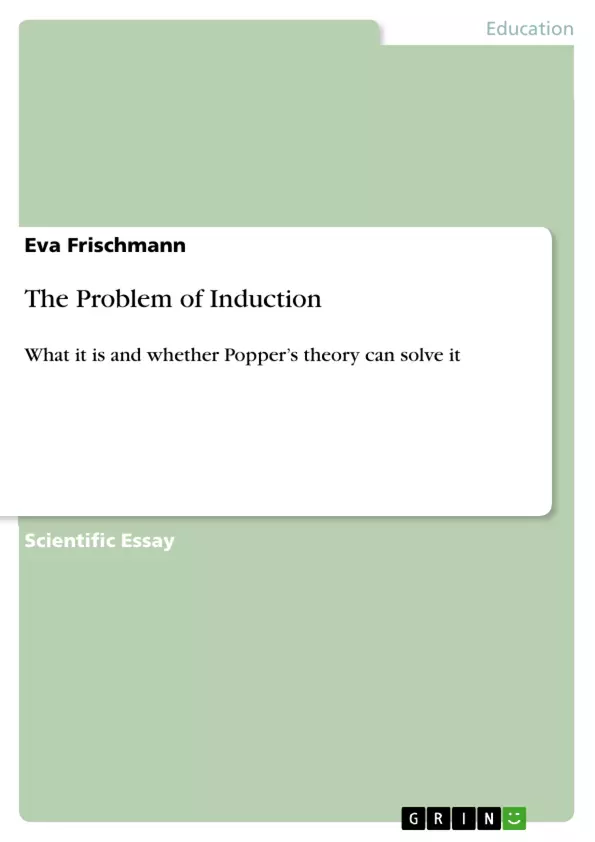The Problem of Induction has often been considered to be one of the main challenges in the philosophy of science (see e.g., Noonan 1999: 11, Ladyman 2005: 39, Beebee 2006: 37). Even Maxwell (1972) highlighted the relevance of the problem as it might undermine the rationality of science (Maxwell 1972: 137-140). The present paper does not aim at providing a review of the entire debate but has a rather modest aim: Presenting one particular view of the Problem of Induction and evaluating in how far Popper’s theory might be seen as a solution to this problem. Our first point will be to define (one version of) the Problem of Induction. Having done so, the task will be to look at what Popper says with regard to this problem. It will turn out that there are three main lines of reasoning within Popper’s work concerning the Problem of Induction, namely his falsificationist account, his anti-justificationist account, and his rationalist account. For each of those lines of argumentation, we will examine what Popper means by it, why he claims it, whether we are convinced by it and whether it might solve the Problem of Induction.
Table of Contents
- Introduction
- Defining the Problem of Induction
- Considering Popper's theory as a possible solution to the problem
- Popper's first claim: ‘Science does not involve induction.'
Objectives and Key Themes
This paper examines the Problem of Induction, a crucial challenge in the philosophy of science, by focusing on Karl Popper's theory as a potential solution. The objective is to define the problem, analyze Popper's various arguments, and determine whether his approach can be considered a solution.
- The Problem of Induction
- Popper's Falsificationist Account
- Popper's Anti-Justificationist Account
- Popper's Rationalist Account
- Evaluation of Popper's Theory as a Solution
Chapter Summaries
- Introduction: This chapter introduces the Problem of Induction as a central challenge in the philosophy of science and sets the stage for evaluating Popper's theory as a potential solution.
- Defining the Problem of Induction: This chapter outlines a detailed formulation of the Problem of Induction, highlighting the core assumptions and logical steps involved in reaching the conclusion that science cannot be rational.
- Considering Popper's theory as a possible solution to the problem: This chapter lays out Popper's key claims about the Problem of Induction, particularly his falsificationist approach. It analyzes the premises and line of reasoning behind his claims, emphasizing the "Rationality Principle" as a pivotal element in Popper's argumentation.
- Popper's first claim: ‘Science does not involve induction.' This chapter delves into Popper's falsificationist claim, examining the reasoning behind it and considering whether it can be seen as a valid solution to the Problem of Induction.
Keywords
The main keywords and focus topics of this work include the Problem of Induction, scientific rationality, falsificationism, justification of induction, Karl Popper's theory, the Rationality Principle, and the relationship between science and truth.
Frequently Asked Questions
What is the "Problem of Induction" in philosophy?
The Problem of Induction questions the logical justification for inferring universal laws or future events from a limited set of past observations, potentially undermining the rationality of science.
How does Karl Popper attempt to solve the Problem of Induction?
Popper argues that science does not actually involve induction. Instead, he proposes a falsificationist account where theories are tested by attempts to prove them false rather than trying to prove them true through observation.
What are the three main lines of reasoning in Popper’s work regarding this problem?
The three lines are his falsificationist account, his anti-justificationist account, and his rationalist account.
What is the "Rationality Principle" in Popper's theory?
The Rationality Principle is a pivotal element in Popper's argumentation used to evaluate whether his falsificationist approach can maintain the rationality of scientific practice without relying on inductive logic.
Is Popper's theory considered a definitive solution to the problem?
The paper evaluates Popper's claims to determine if they are convincing and whether they truly solve the Problem of Induction or merely bypass it by redefining scientific methodology.
- Citar trabajo
- Eva Frischmann (Autor), 2012, The Problem of Induction, Múnich, GRIN Verlag, https://www.grin.com/document/198748



